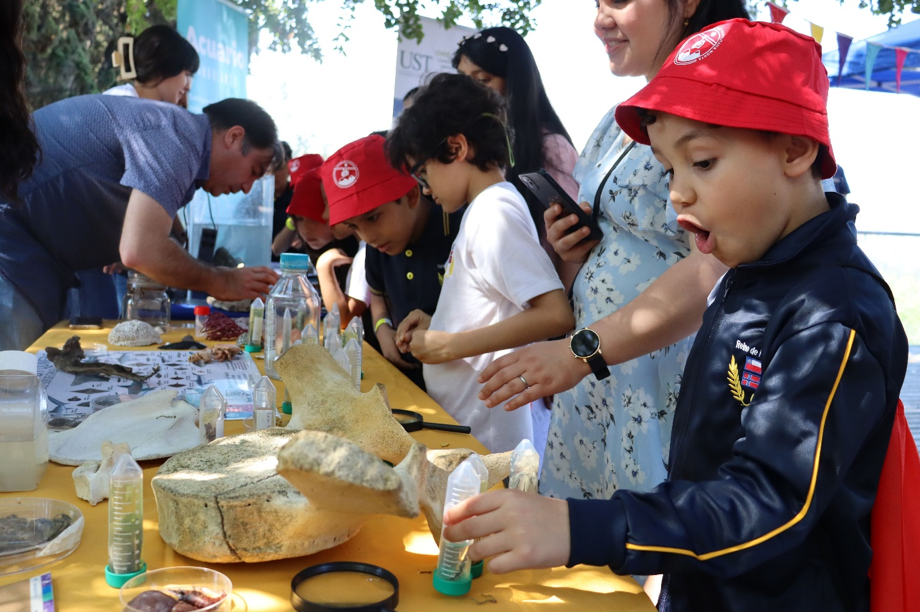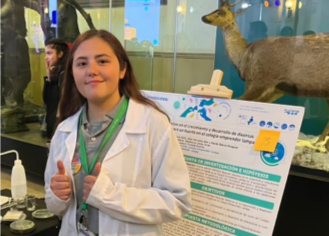News
La ciencia necesita que nos atrevamos
- April 10, 2025
- Posted by: ACCDIS
- Category: Featured News News

Así lo destacó Francisca Lara, estudiante de Bioquímica en la Universidad de Chile y ex participante de Clubes Científicos Escolares 2023-2024, quien resaltó la importancia de involucrarse en iniciativas científicas desde la escuela. Gracias a su participación en Investigación e Innovación Escolar (IIE), logró adjudicarse uno de los Cupos Explora UNESCO, otorgados por el Programa Explora.
Desde el 17 de marzo, se invita a profesionales de la educación que trabajen en Establecimientos Educativos o Jardines Infantiles de las 22 comunas del Regional Associative Project Explores Northern Metropolitan Region, a postular a las distintas iniciativas gratuitas que promueven el desarrollo y fortalecimiento de las competencias en ciencia, tecnología, conocimiento e innovación (CTCI), la investigación científica escolar, el pensamiento crítico y la curiosidad desde primeras edades.
Podrán participar centros educativos pertenecientes a: Santiago, San Joaquín, San Miguel, Pedro Aguirre Cerda, Curacaví, Talagante, Isla de Maipo, El Monte, Peñaflor, Padre Hurtado, Melipilla, María Pinto, San Pedro, Alhué, Recoleta, Independencia, Quilicura, Conchalí, Lampa, Huechuraba, Colina y Tiltil.
El PAR Explora Región Metropolitana (RM) Norte, es financiado por el Ministerio de Ciencias, Tecnología, Conocimiento e Innovación y liderado por el Centro Avanzado de Enfermedades Crónicas (ACCDiS) a través de la Universidad de Chile y su Facultad de Ciencias Químicas y Farmacéuticas.
Convocatorias disponibles
INDAGATION PROGRAM FOR FIRST AGES (PIPE): Methodological proposal to develop competences for the assessment of the CTCI in pedagogical teams, boys and girls of medium levels and transition of parvular education. This year 3 areas of learning will be worked: Technology, Natural Sciences and Social Sciences.
They can postulate educators/es of toddlers, technicians in participation, educators/is differential, psychopedagogues or other professionals who work in parvular education. More information here.
School Investigation and Innovación (III): Teaching and Learning Process that seeks to promote the development of competencies for research and innovation in educational communities, through the implementation of Explorer Clubs of School Scientific Knowledge and Mini Explorer@s.
Another gratifying experience is that of Francisca Lara, a student of biochemistry at the University of Chile and former participant of school research and innovation, who stressed that his experience in this initiative marked his academic path. "My experience was very positive. I loved when they invited us to events in museums, research laboratories and meetings with professionals, who guided us in the formulation of our research. Without a doubt, I recommend being part of these initiatives not only for learning and experiences, but also because they also open academic opportunities for the university. I invite everyone to dare, science needs us to dare."
- Mini Explorer@S: Aimed at 1st students. 4th. Basic, who, through a guided and active methodology proposal, will develop scientific competences to identify problems and propose solutions from their own interests. This year the “Heritage and Interculturality” module will be worked on, which was prepared in collaboration with the National Conservation and Restoration Center (CNCR) of the Patrimonial Service. More information here.
- Explorer clubs of knowledge: aimed at 5th students. Basic to 4th. Medium, who will develop research around local problems in areas such as natural sciences, social sciences, technology, innovation, arts and humanities. More information here.
The scientific community is also part of this initiative, since all groups of participating students of Iie Clubs will have an advisor scientist, who will support the research process. Therefore, since March 26, the scientists of various areas of knowledge can apply for advice to the IEE teams.
In this sense, Gonzalo Montes, of the Department of Engineering in Mines of the University of Chile, commented his experience as a 2024 scientific advisor. “Being part of this program is key to activating students. In addition, it is an opportunity to know how they approach science. It was a very positive experience in which I could see their motivation and develop new ideas together with them”.

Another gratifying experience is that of Francisca Lara, a student of biochemistry at the University of Chile and former participant of school research and innovation, who stressed that his experience in this initiative marked his academic path. "My experience was very positive. I loved when they invited us to events in museums, research laboratories and meetings with professionals, who guided us in the formulation of our research. Without a doubt, I recommend being part of these initiatives not only for learning and experiences, but also because they also open academic opportunities for the university. I invite everyone to dare, science needs us to dare."
To close, Bárbara Reyes Support Professional at the Archaeological and Ethnographic Heritage Unit of the National Conservation and Restoration Center (CNCR), valued collaboration for more than three years, with mini explorer@s and highlighted its impact on heritage education. "Our participation in these initiatives allows us to offer a perspective that fuses science and heritage, promoting committed citizens with the preservation of their cultural heritage. We invite interested teachers to explore cultural heritage to participate. This is an excellent opportunity to enrich learning with interdisciplinary experiences."
The North Explore RM invites all education professionals and scientists to join this new edition of Iie - Pipe and live a unique learning experience. Applications are already open and represent an opportunity to arouse scientific curiosity, develop research skills and contribute to knowledge from an early age. For more information and applications, visit https://explora.cl/rmnorte/

